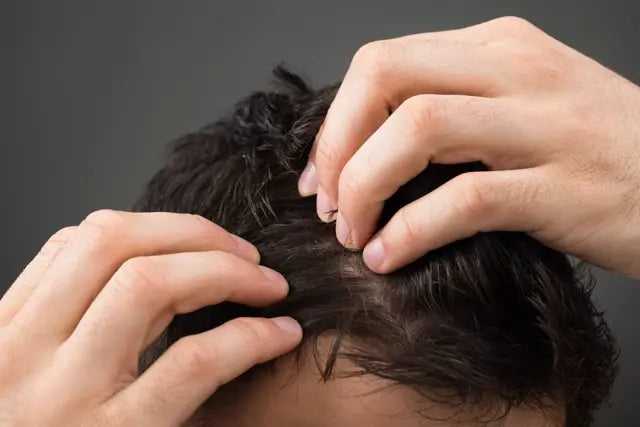There are different types of dandruff. We might find that our dandruff is very dry and keeps coming back several times a year, or we might notice that our dandruff is oily but goes away immediately after treatment. But how do the different types of dandruff affect hair loss?
FUNGAL DANDRUFF
Fungal dandruff is generally caused by a fungal infection like ringworm or an overgrowth of the yeast Malassezia (this is part of the scalp's natural microbiome).
Ringworm is a red or gray circular rash that can appear on any part of the body, including the scalp. It often leads to flaky skin and a dry scalp, and in some cases, it may even cause bald patches and weak, fragile hair.
Ringworm needs to be treated as soon as possible. Beyond the discomfort it causes, it is also contagious.
Malassezia is another type of fungus that contributes to dandruff. The overgrowth of Malassezia can be caused by scalp conditions like seborrheic dermatitis (a type of chronic eczema). It can also trigger scalp conditions like Malassezia folliculitis (an overgrowth of yeast on hair follicles leading to inflammation). These conditions can contribute to an irritated scalp and can also interfere with the growth of hair.
Although fungal dandruff can cause hair loss, this is usually temporary. Typically, once the fungal infection is treated, dandruff and the hair loss triggered by it should subside.
CHRONIC DANDRUFF
Sometimes dandruff might be caused by a chronic medical condition like seborrheic dermatitis. When a skin condition is chronic, it means that it will most likely keep coming back. Although it is not yet possible to fully treat chronic dandruff, your doctor or healthcare professional might suggest tips, like using medicated shampoo and eating a well-balanced diet, to minimize discomfort and prevent hair loss.
WET DANDRUFF
Wet dandruff is a type of scalp condition that results from oil buildup on the scalp. Instead of dry, scaly skin and white flakes, wet dandruff causes yellow and oily flakes to appear on the scalp.
It is often an underlying dermatological condition that causes wet dandruff. Other times it may be caused by genetic or environmental factors. Some of the reasons we might encounter wet dandruff on our scalp include:
- Seborrheic dermatitis.
- Psoriasis (a type of autoimmune skin condition that causes greasy, crusted patches to appear on our scalp).
- Not washing hair often enough.
- A naturally oily scalp.
Although wet dandruff does not directly cause hair loss, it can create discomfort and inflammation. Similarly to dry dandruff, intense scratching caused by wet dandruff can contribute to hair loss and thinning. It is important to talk to a healthcare professional if you are experiencing excessive hair loss caused by dandruff.
EXCESSIVE DANDRUFF
With mild and moderate dandruff, we might notice a dry, scaly scalp and a few flakes falling from our scalp to our shoulders.
A severe case of dandruff causes our scalp to feel raw and crusty. This type of dandruff may lead to constant itching and will often fail to respond to standard over-the-counter treatment. To prevent hair loss and further injury to the scalp, your dermatologist might prescribe:
- Topical medications, like a topical steroid cream to apply to your scalp.
- Antifungal medication to take orally or apply directly to your skin.
- A solution to apply to your scalp and leave overnight repeatedly for a period of time.
It is important to speak to your physician or medical provider to find out what is causing your dandruff. You might even find that excessive or stubborn dandruff is caused by another skin condition like psoriasis, eczema, allergies, or an autoimmune disease.

